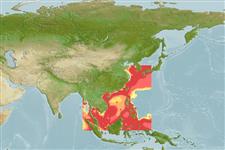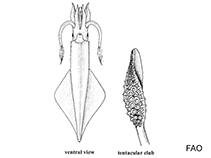Loliolus beka (Sasaki, 1929)
Beka squid| Native range | All suitable habitat | Point map | Year 2050 |

|
| This map was computer-generated and has not yet been reviewed. |
| Loliolus beka AquaMaps Data sources: GBIF OBIS |
Google image | No image available for this species;
drawing shows typical species in Loliginidae.
Classification / Names आम नाम | उपशब्द | CoL | ITIS | WoRMS
Cephalopoda | Myopsida | Loliginidae
Environment: milieu / climate zone / गहराई सीमा / distribution range पारिस्थितिकी
पिलाजिक; गैर प्रवासी (संदर्भ 75927), usually 60 - ? m (संदर्भ 75927). Tropical; 38°N - 1°S, 94°E - 135°E (संदर्भ 97142)
Distribution देश | ऐफ ऐ ओ क्षेत्र | Ecosystems | संयोग | भूमिका
Indo-West Pacific: From Japan and South Korea to Hainan Island, the Gulf of Thailand and the Andaman Sea. Tropical to temperate.
Length at first maturity / आकार / Weight / Age
परिपक्व अवधि: Lm ? range ? - ? cm Max length : 7.0 cm ML पुल्लिंग / अलिंग; (संदर्भ 75927)
Life cycle and mating behavior परिपक्व अवधि | पुनरुत्पत्ति | मछलीऔ का अंडे देना | Eggs | Fecundity | Larvae
Main reference
संदर्भ | संयोजक | सहयोगीयो
Roper, C.F.E., M.J. Sweeney and C.E. Nauen 1984 FAO Species Catalogue. Vol. 3. Cephalopods of the world. An annotated and illustrated catalogue of species of interest to fisheries. FAO Fish. Synop. 125(3):277p. Rome: FAO. (संदर्भ 275)
IUCN Red List Status
(संदर्भ 130435: Version 2025-1)
CITES status (संदर्भ 108899)
CMS (संदर्भ 116361)
Threat to humans
Human uses
| FishSource |
साधन
अधिक जानकारी
इंटरनेट स्रोत
BHL | BOLD Systems | CISTI | DiscoverLife | FAO(Publication : search) | Fishipedia | GenBank (genome, nucleotide) | GloBI | Gomexsi | Google Books | Google Scholar | Google | PubMed | Tree of Life | Wikipedia (Go, खोज) | Zoological Record



